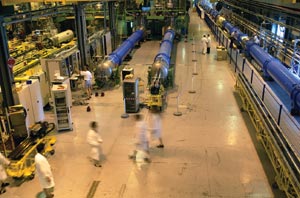
The CERN Council has nominated Robert Aymar, director of the International Thermonuclear Experimental Reactor (ITER), to succeed Luciano Maiani as the laboratory’s director-general, to take office on 1 January 2004. Aymar, who will serve a 5 year term, will oversee the start-up of CERN’s current major project, the Large Hadron Collider (LHC) in 2007. He was previously with the French Atomic Energy Commission (CEA), and directed the Tore Supra – one of the world’s largest tokamaks, based on superconducting toroidal magnets – from its design in 1977 through to its operation in 1988. He is familiar with the challenges presented by the LHC project, as he chaired the External Review Committee that was set up in December 2001 in response to the increased cost to completion of the LHC. Commenting on his appointment, Aymar said: “I am very honoured by this decision, and I thank the Council members for the confidence put in me. CERN is a prestigious institution; I will follow the good examples set by my predecessors, and with the help of the CERN staff, collaborators and supporters, I hope to be able to provide the institution with a future as brilliant and successful as it deserves.”
The LHC is now the main focus of activity at CERN, as components for the accelerator arrive at the laboratory from around the world. Council secured the future of the LHC project by unanimously endorsing the new Baseline Plan for 2003-2010, based on a revision of the 1996 financial framework for the LHC, which confirms the target of commissioning the LHC in April 2007. Most of CERN’s resources will be committed to the project, leaving only a very limited non-LHC programme. In the plan, overall cost-to-completion budgets (including materials and personnel costs, as well as a contingency) are set for the construction of the LHC and for CERN’s share of detector construction.
With the activities surrounding the LHC, CERN’s community of scientific users has grown to comprise about half of the world’s experimental particle physicists, with nearly a third coming from outside the CERN member states. India has been an active partner for many years, and in the December meeting, Council granted the country observer status. In the past, India has contributed equipment and technical teams to LEP, the PS injector complex and fixed-target experiments. This effort was formalized in a co-operation agreement in 1991, extended in 2001 for a further decade. Then, in the framework of the 1996 protocol signed with the Indian Department of Atomic Energy, India became one of the first non-member states to make significant contributions to the LHC. Indian scientists are also valued members of the ALICE and CMS collaborations, and Indian IT expertise is being put to good use in GRID computing projects.
Recognizing the increasingly global nature of particle physics, and CERN in particular, Council also agreed to create an associate status for non-European states that wish to make more substantial contributions to CERN’s activities. The new status would provide a closer partnership, including participation by right in CERN’s activities, eligibility of nationals for appointments at CERN, and entitlement of firms in the associate state to bid for CERN contracts. An associate state would contribute to funding at CERN through an annual contribution, but at a lower level than a member state.








